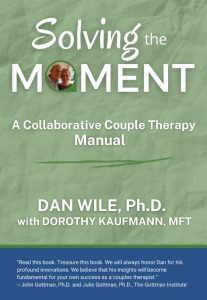When you double in Collaborative Couple Therapy, you speak as if you were one of the partners talking to the other. “Okay, Joe, so you’re saying to Felicia, ‘When we fight, I feel very alone.’” You become the partner you’re speaking for. Use of the pronoun “I” collapses the space between you and that person. […]
Posts in category Dan Blog
THE “MULTIPLE CHOICE” AND...
One of the ways couple therapists try to deepen the therapeutic conversation is to ask, “What do you think about what happened” or “How do you feel about what your partner just said?” If a client answers, “I don’t know,” I ask, “What’s your best guess?” or “This is a trick question but, if you […]
CREATING INTIMATE CONVERSATIONS
In an earlier newsletter, I gave the following example of the kind of intimate conversation that I try to help partners have. Brad: I’m embarrassed to say this but sometimes—maybe more than sometimes—I worry that you’re more important to me than I am to you. Lisa (genuinely surprised): That’s amazing to me. You wouldn’t believe […]
WHY THE RULES OF GOOD COMMUNICATION A...
The problem with these rules is that you can’t use any of them when you’re angry—which, of course, is when you most need them. Communication skills trainers are sad about it and I’m sad about it, too. You can’t use any of them when you’re angry because they’re telling you in essence, “Don’t be angry.” […]
THE THREE DEFINING ELEMENTS OF COLLAB...
Collaborative Couple Therapy consists of a theory (solving the moment), a technique (speaking for partners), and a sensibility (monitoring the therapist’s slippage from listening to judging). I came to this realization while writing my chapter for Case Studies in Couples Therapy edited by David Carson and Monterrat Casado-Kehoe and published in 2011. The following is […]
A ONE-PAGE DESCRIPTION OF COLLABORATI...
I was asked to describe my couple therapy approach first in two sentences, then as a paragraph, and finally as a set of principles. When I showed what I wrote to colleagues, some asked if they could revise it to fit their approach and show it to the couples in their practice. If any of […]
HELPING CLIENTS REJECT MY INTERVENTIO...
In my previous newsletter, I described how I try to create intimate conversations by translating accusatory comments into confiding ones. Barry says to his wife, “Karen, can’t you stop dwelling on the past and move on?” I say, “Barry, I wonder if you’re feeling—and here I’ll be you talking to Karen—‘Karen, I’m so ashamed of […]
CREATING AN INTIMATE EXCHANGE
In my previous newsletter, I talked about creating intimate moments for couples, what Susan Johnson calls “softening.” Gemma Utting, commenting on my newsletter, reported difficulty creating such softening when people have resentments they need to express but their partners can’t stand listening to them. Gemma gives the example of Barry, who had been depressed for […]
COULD INTIMACY BE JUST A SENTENCE AWA...
We know that a fight can be just a sentence away. Joe: What do you feel like doing this weekend? Rose: Well, I’ve been thinking about the new Woody Allen movie. How does that sound? Joe: Great. And we can try that Thai place that just opened. Rose: And you remember, don’t you, my brother’s […]
CAN’T YOU COME TO THE POINT
“How do you get your spouse to come to the point of what they are saying without hurting their feelings?” Lee Barclay, who’s editing a book about people’s biggest relationship questions, asked me to write an answer. My first thought was this is really part of the larger question: how do you express dissatisfaction or […]


